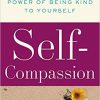Focusing is one of the few methods that has helped me understand depression as I experience it, well beyond the scope of clinical descriptions. It has also given me an approach to self-compassion that is more effective than the various meditations I have tried.
As Eugene Gendlin acknowledges in Focusing, his self-help version of the method he developed, some people feel they must suffer the full feelings of their problems, including depression. To do anything else means that they are running away from them or else trying to sugar-coat the real difficulties of living.
The resistance to focusing he describes is exactly like my resistance to self-compassion and self-kindness.
A Fair Hearing
Focusing requires a stepping back or detachment from the pain you feel but not for the purpose of avoiding or suppressing it. The method offers a third way between being overwhelmed by your problems and running from them.
You step away a short distance in order to understand them more clearly and respond to what they tell you. As Gendlin describes it, “You establish an environment of friendly feeling within yourself. You prepare to give yourself a fair hearing.”
The idea of a fair hearing sounds right. You open yourself on all levels to listen and respond to what your body is telling you about the pain or feeling of being stuck that troubles you.
This is a way into self-compassion that doesn’t press my buttons about weakness or running away or self-coddling. I can relax enough to give myself that hearing. I can ask: “How are you now? What’s the main problem troubling you?”
The Body’s Sense of Pain
I don’t answer with words but wait for my body to give me signals. I can’t hear or feel them unless I’m relaxed enough to observe rather than be engulfed by the feelings.
To paraphrase Gendlin, it’s like carrying a heavy load without knowing what it is. You have to set down the burden to open the sack and see what’s in there.
When you feel an emotional pain or burden, your body is giving you a signal. The interconnected systems of the body are always working to keep you in a balanced state of well-being.
Pain of any sort is a measure of how far you have moved away from that balance.
Depression is a heavy bundle of many things, and setting down that load gives you a lot to sort through. Focusing is a process of picking out the one thing that is causing the most pain at that time and learning from your body’s sense of it.
Active Waiting
You have to relax and hold the analytical mind silent for a while because the body’s response is not immediate. Gendlin says that it takes about 30 seconds or a minute or two, but most people won’t even give themselves that much time.
I’m as jumpy as anyone when it comes to holding still and opening to myself. There’s that nagging sense of depression that I’m not meant to be OK. Depression doesn’t want me to heal. The tendency is to run from the self-care or compassion that gives me a chance to feel better.
It was easier to learn to wait for the felt sense in my body when I thought about what I go through while trying to sleep.
Paying Attention to Sense
I might lie down but at once feel my mind buzzing with wakeful thoughts. My impulse is to get up, forget sleeping, attend to those ideas – but I know from experience that I need to give my mind a while to run its race.
I know that my body is telling me it needs to rest, so I wait for the mind to spin off the waste heat as it shuts down the engine. I’m detached from the flow of thoughts while getting in touch with the deeper feeling in the body that it’s time to slow down.
That’s a moment of focusing that everyone goes through from time to time. You’re observing the contents of your mind but also letting them just go by. You’re waiting for your body, listening for its deeper need for rest. Soon the body will self-correct, calm the mind and help you get the sleep you need.
If you cannot detach from that swarm of ideas, you really become your racing mind and never sleep. Later your body’s sense gets strong enough that your mind can’t shut it out. You drag yourself around. Your body is telling you that the measure between you and well-rested health is too big to tolerate.
Self-Trust and Healing
Learning how to clear a space to begin focusing is a way of consciously cultivating this awareness of your body’s sense of well-being and how far away from it you are.
You trust your body’s instinct to tell you what is wrong, where it hurts, and pay attention to the sense and feeling of this painful thing you’ve been carrying.
That’s when you start going deeper, not just listening but asking your inner sense more specifically what’s going on. Recently, I went through something like this:
There’s a weight I feel in my center. It’s heavy, but that’s not quite right. There’s more of a deadness, a stillness. But also a willfulness, a refusal to budge. But under that is something else – I’m not sure what, an anxiousness, a fear. No, shame, that’s it. It’s the shame that is so overwhelming.
When I feel I’ve gotten it right, something clicks inside. There’s a sense of release. I feel lighter, less weighed down.
This is not like listening to an analysis. It’s a gradual process of feeling one thing after another, listening for words that get closer and closer to matching the state you’re in. Each one that hits it gives you a peaceful sense of “That’s right.” But there is always more, so you go through many phases of focusing. Gradually, you get to know how the problem is distorting your life and what you can do to change.
But that first moment you know things are not right is the moment you have stepped a bit away from depression to look for healing.
That’s the meaning of self-compassion that makes the most sense to me. You give yourself a space to heal.
This is a post from the archives.





Thank You so much for writing this article!
You are right. When I take the time to name, to acknowledge and co exist with the thing that’s causing pain, I can sleep, I keep depression at bay, and I move closer to doing something or simply be at peace with doing nothing. For example, the way my husband interacts with me is often harsh, demeaning, critical, more like a father who chastises and reprimands constantly. I have constantly remind myself that what he says about me, how is reacts, are not a true representation of my identity, or who I am. It is his opinion, his reaction to me, his way of looking at the world, of relating to me. When I take the time, each day to stop and name his truth and my truth and build a fence of prayer around my mind and soul, I can sleep because I can have compassion and understanding for me and for him. I don’t get depressed about it anymore because I take the time to focus on it enough to disarm its potential to harm me beyond the initial sting of harshness, disapproval and verbal abuse. This is my daily battle at home.
Hi –
I’m glad you have found these methods to focus on your truth rather than accepting your husband’s version of who you are. But I’m sorry that you are living with the harshness and verbal abuse every day. I hope the two of you can work through this in some form of joint therapy.
All my best to you —
John
Usually I think of a “sense that things aren’t right” as being aware of depression, not being aware that my body is telling me to stop and focus. So, once you focus in and in until you find a good name for what is not right, then what do you do with it? Yes, have self-compassion, certainly. But there is sitll that urgency to do something about it. Are you saying to sit with the feeling and patiently wait it out, to give it space to heal? If I give that heaviness space, it just seems to expand, not dissipate.
Hi, Donna –
I don’t think of focusing as the only thing you do. It is one method of exploring what is feeling wrong, and for me it is a very powerful place to begin when depression is in its early state and I’m not sure what’s happening. There is focus-oriented therapy which puts this method into the bigger context of treating depression as a whole. I also think it’s a good complement to ACT because it gets you away from trying to explain in intellectual terms what you are experiencing. So, I use focusing as a way of recognizing and grounding myself. If you use this method, it’s more akin to mindful awareness than sinking into the feelings of depression. I’ll have to write more about this!
I hope you are well —
John
I see; thank you. What I usually gravitate towards is mindless escape from awareness. With a bag of Doritos and a pint of Ben & Jerry’s.